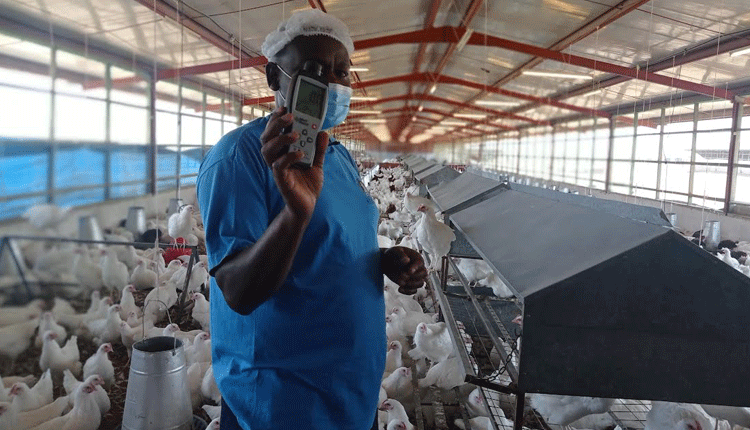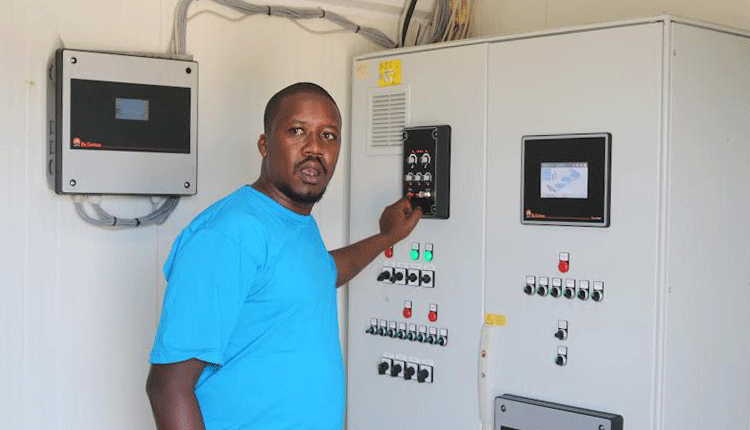Farm leverages tech to improve animal welfare and food safety

The popularity of chicken meat is growing in Kenya, thanks to the rising middle class, fast-food joints, and health benefits associated with white meat.
As demand for chicken meat and eggs grow, so does the number of chicken farms.
Unlike before when poultry farmers used to keep their birds in cramped and unnatural environments as units of production in total disregard for their welfare, today’s farmers have been tasked to raise the birds in a humane environment to produce safe food for the growing population.
In addition, consumers are increasingly demanding food that meets high standards of quality and animal welfare all at an affordable price.
But how are farmers and companies managing all this? Samuel Ali, farm manager at Kenchic Kakuzi broiler Farm says that the use of technology has enabled the company to not only produce safe and quality food, but also ensure that they comply with both national and international animal welfare standards.
“All our farms are fully automated starting from our breeder farms to our broiler farms.
The whole value chain is controlled. Automation has helped us improve animal welfare practices on our farms. This has also helped us to better locate our resources,” he says.

Good animal welfare, as outlined by the World Organisation for Animal Health (OEI) means ensuring that animals are: healthy, comfortable, well-nourished, safe, able to express innate behaviour and not suffering from unpleasant states, such as pain, fear, and distress
According to him, the systems automatically collect various kinds of information about the animals thus allowing them to monitor the birds remotely.
However, the farm has workers who are also housed within the premises to ensure that there is a relationship between humans and the birds.
He reveals that technological developments have led to an increase in the standards of farm animal health, welfare, and product quality.
He urges farmers to embrace new technologies in food production since it is critical to ensuring a safe, secure, and sustainable food supply.
Another employee Daniel Ogwalla, Kenchic Breeder Production Manager says that apart from using technology, they rarely allow visitors in their farms as a way of protecting the birds from negative interactions.
If we must have visitors, there are some biosecurity measures put at the farm to ensure that no pathogens are transferred to the birds on the farm.
“We have showers within every 20 metres of our farms and we expect any person going into the farms to shower before accessing our housing units.
We also place disinfectant troughs at every entrance. This has helped as control outbreak of diseases thus ensuring minimal medication,” says Ogwalla.
For their housing units, they use a deep litter housing system that holds five hens per metre square and three cocks per metre square. This is the recommended spacing worldwide.
Their feeding and watering systems are also automated to ensure that during feeding, every bird is fed within three minutes.
Clean portable water is always available and sometimes goes through some testing to ensure that it is of the best quality.
Automated systems
To make the birds comfortable, they also monitor wind speed, carbon dioxide concentration, temperature, as well as ammonia, which hurts birds’ respiratory systems.
At the broiler farm, they have heaters for temperatures regulations. “With all these in place, we can comfortably say that our birds are always free from hunger and thirst, discomfort, pain, injury, and disease, they can express normally and in natural behaviour and are free from fear and distress,” adds Ogwalla.
And how does one know their animal welfare efforts are efficient? Ali says that if the birds are eating and drinking as they should, then they are happy.
Every 1.65 kilogrammes of feeds taken by the bird should translate to one kilogramme of meat for a properly managed bird.
Apart from that, mortality rate is also another performance indicator as well as feed conversion ratio and average live weight.
For food safety, they ensure that each of their product can be traced back from its origin.
The processing plant is also fully automated to ensure that birds are not exposed to inhumane pain.
Apart from that, they control the temperature throughout the processing plant because different products require different temperatures.
“We stun our chicken before they are slaughtered. We also hang them upside down to drain all the blood.
Retaining blood traces may affect the quality of the meat and the safety of the meat.
Afterward, the birds move to automated blades that cut their throats,” said Anton Scheepers, Head of Operations Processing and Sales Divisions, at Kenchic.
On the issue of injecting their birds with growth hormones, Anton says that they have never and can never do so since as a company, they are 100 per cent committed to food safety and animal welfare standards.
He revealed that they also don’t use antibiotics on their birds unless advised by their veterinarian. Instead, they vaccinate them against common diseases on day one.
“We believe that animal welfare is an integral component of our operations as a good human-chicken relationship is paramount to good farm performances as well as guaranteeing animal rights,” he added.
According to him, the company has made some ambitious commitments around sourcing, sustainability, and animal welfare.
Because of those commitments, technology will continue to play a bigger role in their supply chain.








